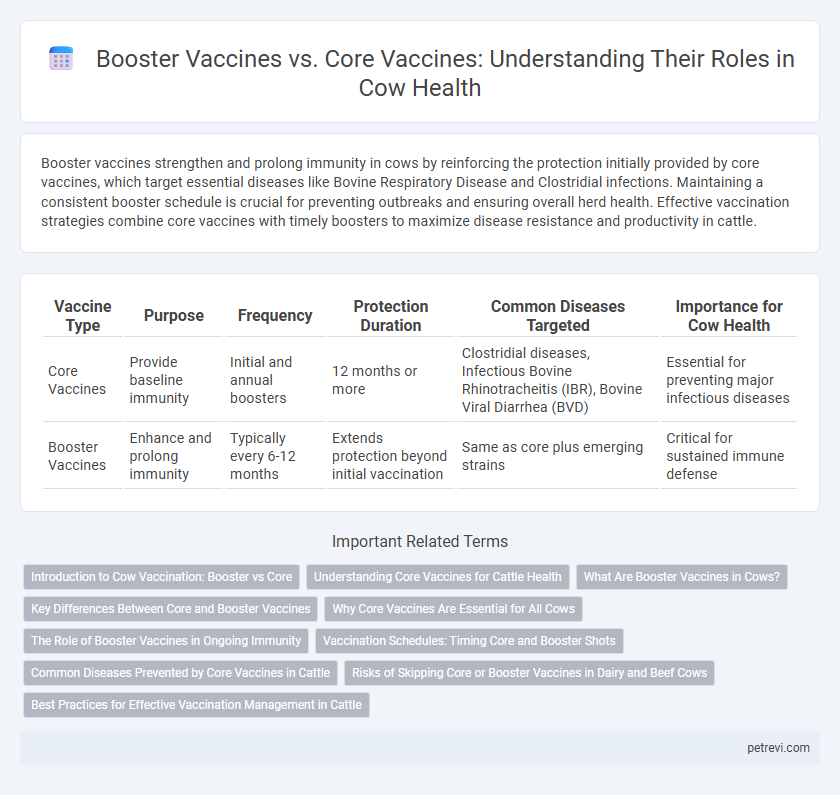Booster vaccines strengthen and prolong immunity in cows by reinforcing the protection initially provided by core vaccines, which target essential diseases like Bovine Respiratory Disease and Clostridial infections. Maintaining a consistent booster schedule is crucial for preventing outbreaks and ensuring overall herd health. Effective vaccination strategies combine core vaccines with timely boosters to maximize disease resistance and productivity in cattle.
Table of Comparison
| Vaccine Type | Purpose | Frequency | Protection Duration | Common Diseases Targeted | Importance for Cow Health |
|---|---|---|---|---|---|
| Core Vaccines | Provide baseline immunity | Initial and annual boosters | 12 months or more | Clostridial diseases, Infectious Bovine Rhinotracheitis (IBR), Bovine Viral Diarrhea (BVD) | Essential for preventing major infectious diseases |
| Booster Vaccines | Enhance and prolong immunity | Typically every 6-12 months | Extends protection beyond initial vaccination | Same as core plus emerging strains | Critical for sustained immune defense |
Introduction to Cow Vaccination: Booster vs Core
Core vaccines for cows provide essential protection against prevalent diseases such as bovine viral diarrhea, infectious bovine rhinotracheitis, and clostridial infections. Booster vaccines are administered periodically to reinforce immunity and maintain effective disease resistance over time. Implementing a strategic vaccination schedule combining both core and booster vaccines is critical for optimizing herd health and minimizing economic losses in cattle farming.
Understanding Core Vaccines for Cattle Health
Core vaccines for cattle protect against foundational diseases like bovine respiratory disease complex, clostridial infections, and infectious bovine rhinotracheitis, ensuring overall herd immunity. Booster vaccines enhance and prolong immunity acquired from core vaccinations, crucial for maintaining protection during high-risk periods such as calving or seasonal outbreaks. Understanding the role of core vaccines aids cattle producers in implementing effective vaccination schedules that reduce morbidity and improve livestock productivity.
What Are Booster Vaccines in Cows?
Booster vaccines in cows are additional doses administered after the initial core vaccination to enhance and prolong immunity against infectious diseases such as bovine respiratory disease and clostridial infections. These vaccines help maintain protective antibody levels and ensure sustained immune defense throughout the cow's productive life. Timely booster vaccination is crucial for preventing outbreaks and maintaining herd health in dairy and beef operations.
Key Differences Between Core and Booster Vaccines
Core vaccines for cows provide essential, long-lasting immunity against common and highly contagious diseases like bovine viral diarrhea (BVD) and infectious bovine rhinotracheitis (IBR). Booster vaccines are administered periodically to reinforce immunity and ensure continued protection, especially when initial vaccine effectiveness wanes over time. The primary difference lies in the core vaccines establishing baseline immunity, while boosters sustain and elevate the immune response to maintain herd health.
Why Core Vaccines Are Essential for All Cows
Core vaccines for cows, such as those protecting against Bovine Viral Diarrhea (BVD), Infectious Bovine Rhinotracheitis (IBR), and Clostridial diseases, are essential because they provide broad immunity against diseases that can cause significant economic losses and impact herd health. Booster vaccines serve to reinforce this immunity, especially in young calves or cows with waning protection, but the foundation of disease prevention relies on consistent core vaccine administration. Ensuring all cows receive core vaccines reduces the risk of outbreaks, maintains productive performance, and supports animal welfare on the farm.
The Role of Booster Vaccines in Ongoing Immunity
Booster vaccines play a critical role in maintaining long-term immunity in cows by reinforcing the immune system's memory against core diseases such as Bovine Viral Diarrhea (BVD), Infectious Bovine Rhinotracheitis (IBR), and Clostridial infections. While core vaccines provide initial protection during early life stages, booster doses are essential to sustain protective antibody levels, reducing the risk of disease outbreaks in dairy and beef herds. Regular booster vaccinations optimize herd health management, ensuring continuous immunity and improving overall production efficiency.
Vaccination Schedules: Timing Core and Booster Shots
Core vaccines for cows, such as those targeting bovine viral diarrhea (BVD) and infectious bovine rhinotracheitis (IBR), require initial doses administered in early calfhood, typically between 3 to 6 months of age. Booster vaccines are scheduled annually or biannually to maintain immunity, with timing adjusted based on herd exposure risk and vaccine type, ensuring sustained protection against prevalent diseases. Proper adherence to vaccination schedules optimizes immune response and reduces the incidence of outbreaks within the herd.
Common Diseases Prevented by Core Vaccines in Cattle
Core vaccines for cattle primarily prevent common diseases such as bovine respiratory disease complex, clostridial infections, and infectious bovine rhinotracheitis (IBR). These vaccines provide essential immunity against pathogens like Mannheimia haemolytica, Clostridium spp., and bovine herpesvirus, reducing morbidity and mortality in herds. Booster vaccines enhance and prolong this immunity, ensuring sustained protection against outbreaks and improving overall herd health management.
Risks of Skipping Core or Booster Vaccines in Dairy and Beef Cows
Skipping core vaccines in dairy and beef cows significantly increases the risk of outbreaks of infectious diseases such as bovine viral diarrhea and infectious bovine rhinotracheitis, leading to reduced milk production and compromised herd immunity. Booster vaccines are essential to maintain adequate antibody levels over time, preventing the resurgence of illnesses that can cause severe economic losses and animal suffering. Failure to administer boosters timely can result in decreased vaccine efficacy, higher morbidity rates, and increased veterinary costs in both dairy and beef operations.
Best Practices for Effective Vaccination Management in Cattle
Booster vaccines enhance the immunity provided by core vaccines, ensuring prolonged protection against diseases like Bovine Respiratory Disease and Clostridial infections in cattle. Effective vaccination management involves adhering to recommended booster schedules, proper handling and storage of vaccines, and accurate record-keeping to track vaccination history. Implementing these best practices supports herd immunity and minimizes outbreaks, optimizing overall cattle health and productivity.
Booster Vaccines vs Core Vaccines for Cow Health Infographic

 petrevi.com
petrevi.com